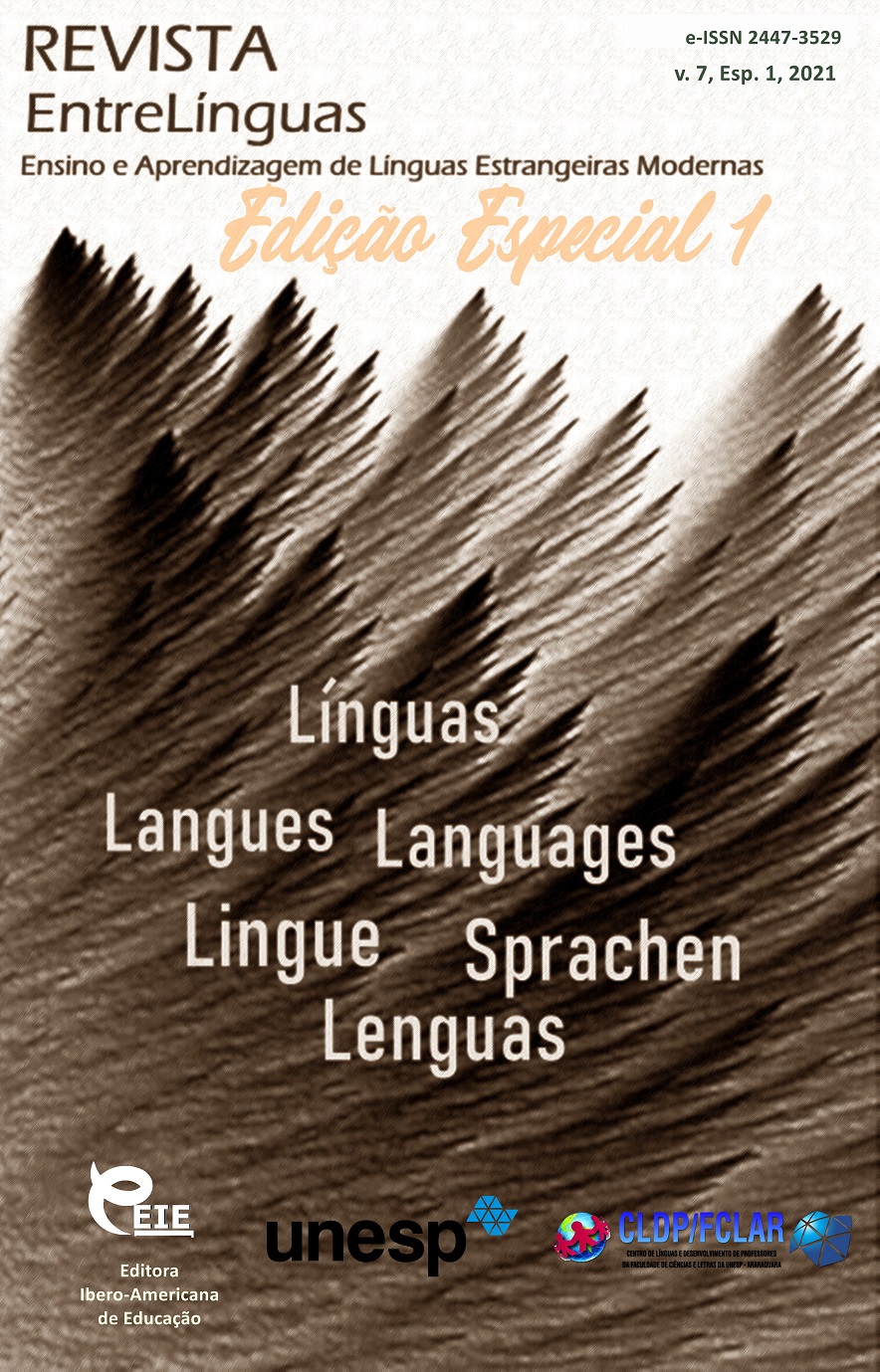Emotional potential of phraseological units in the Tatar language
DOI :
https://doi.org/10.29051/el.v7iEsp1.14871Mots-clés :
Tatar language, Emotional world, Linguoculturology, Emotional concept, EmotionalityRésumé
Emotions have a huge impact on human life. One of the fundamental factors in managing human behavior is emotion. The article is devoted to a brief review of the expression of emotion in the Tatar language. The problem of studying the linguistic picture of the world is closely connected with the problem of conceptual picture of the world that displays the specifics of man and his existence, his relationship with the world, the conditions of his existence. Language picture of the world explicits different world-view and shows the General picture of the world. Human activity, which includes the symbolic, i.e. cultural, universe as an integral part, is both universal and national-specific. These properties determine both the originality of the language picture of the world and its universality. On the basis of modern trends, new directions in linguistics are being formed taking the role of the emotions into consideration: sociolinguistics aspect of emotions, etc., The cognitive aspect of emotions, the psycholinguistic aspect of emotions, and the linguostylistic aspect of emotions. The study presents the authors’ classification of emotionally rich language units. In the article, the authors also offer their vision of the future prospects of studying the topic.
Téléchargements
Références
AYUPOVA, R. A. Rol' paradoksov v formirovanii frazeologicheskoj edinicy kak lingvisticheskogo znaka. Philology and Culture, v. 4, n. 42, p. 35-40, 2015.
BERKER, K. Analysis of Turkic Students Verbal Expression Studies in Turkey Turkish Language by "Speaking Skill Assessment Scale". Tarih kultur ve sanat arastirmalari dergisi-journal of history culture and art research, v. 6, n. 2, p. 358-384, 2017.
FAKHRIEVA, L. K.; KIRILLOVA, Z. N.; ALKAYA, E. Metaphors in Russian Poetry Translations into Tatar. Journal of History Culture and Art Research, v. 6, n. 6, p. 153-158, 2017.
GILAZETDINOVA, G. K.; SALAKHOVA, R. R. Lexical-semantic groups of the verbs of motion in structurally different languages (On the material of the russian and the tatar languages). XLinguae, v. 11, n. 4, p. 32-44, 2018.
ISANBET, N. S. Frazeologicheskij slovar' tatarskogo yazyka. Kazan': Tatar. knizh. izd-vo, 366 s., Tatarsko-russkij frazeologicheskij slovar'. Kazan': Magarif, 2001. 1990. v 2-h t. T. II. 335 р.
ISANBET, N. S. Frazeologicheskij slovar’tatarskogo yazyka. Kazan': Magarif, 1989. V. 2. T. I.
KASEMU, S.; YUSUPOVA, A. S.; DENMUKHAMETOVA, E. N.; MUGTASIMOVA, G. R. Traditions of compiling bilingual dictionaries for turkic peoples. Amazonia Investiga, v. 7, n. 13, p. 156-161, 2018.
KHASANZYANOVA, G. I.; ISLAMOVA, E. A.; BOLGAROVA, R. M.; RAMI, I. Man in the mirror free association experiment. AD ALTA-Journal of Interdisciplinary Research, v. 8, n. 1, p. 190-192, 2018.
MUGTASIMOVA, G. R.; NABIULLINA, G. A.; DENMUKHAMETOVA, E. N. Paremiological fund of the Tatar people in the ethno-linguistic aspect. Life Science Journal, v. 11, n. 11, p. 409-412, 2014.
SAFIULLINA, F. S. Serge tatars by body. Lexicology (yugary UCU yorty studentsare can). Kazan: Khater, 1999. 288 p.
SAFIULLINA, F. S. Tatarsko-russkij frazeologicheskij slovar'. Kazan': Magarif, 2001. 335 р.
VILDANOVA, R. R.; ZAMALETDINOV, R. R.; SATTAROVA, M. R.; ZAMALETDINOVA, G. F. Tatars names as a phenomenon of traditional culture. Astra Salvensis, v. 10, 2017.
YERBULATOVA, I. K.; KIRILLOVA, Z. N.; SAHIN, L. National and cultural realias of translations into tatar. Humanities & Social Sciences Reviews, v. 7, n. 6, p. 984-987, 2019.
YUISUFUVA, Z.; YUSUPOVA, A. S.; MUGTASIMOVA, R.; Denmukhametova, E. N. Paroemiological units of the tatar language with culture-specific lexicon, Modern journal of language teaching methods. Astra Salvensis, v. 5, p. 109-115, 2017.
ZAMALETDINOV, R.; GABDRAKHMANOVA, F.; ZAMALETDINOVA, G. The language picture of the world of the tatars and the national image of the world. Herald NAMSCA, n. 3, p. 782-785, 2018. DOI: https://doi.org/10.32461/2226-3209.3.2018.171842
Téléchargements
Publiée
Comment citer
Numéro
Rubrique
Licence

Ce travail est disponible sous licence Creative Commons Attribution - Pas d’Utilisation Commerciale - Partage dans les Mêmes Conditions 4.0 International.
Os manuscritos aceitos e publicados são de propriedade da Revista EntreLínguas. Os artigos publicados e as referências citadas na Revista EntreLínguas são de inteira responsabilidade de seus autores.
Transferência de direitos autorais – autorização para publicação
Caso o artigo submetido seja aprovado para publicação, já fica acordado que o(s) autor(es) autoriza(m) a UNESP a reproduzi-lo e publicá-lo na EntreLínguas, entendendo-se os termos “reprodução” e “publicação” conforme definição respectivamente dos incisos VI e I do artigo 5° da Lei 9610/98. O artigo poderá ser acessado pela rede mundial de computadores (Internet), sendo permitidas, a título gratuito, a consulta e a reprodução de exemplar do artigo para uso próprio de quem a consulta, desde que haja a citação ao texto consultado. Essa autorização de publicação 328 EntreLínguas, Araraquara, v. 1, n .2, p. 323-328, jul./dez. 2015 não tem limitação de tempo, ficando a UNESP responsável pela manutenção da identificação do(s) autor(es) do artigo. Os artigos publicados e as referências citadas na Revista EntreLínguas são de inteira responsabilidade de seus autores.











